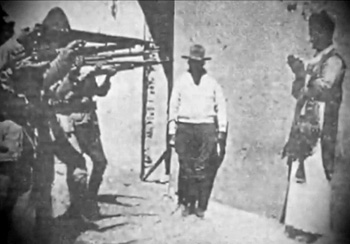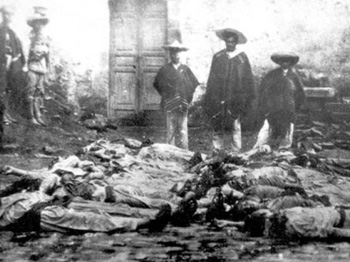Wrong again, Webers_Home.
Mark 3:16; John 1:42 – Jesus renames Simon "Kepha" in Aramaic which literally means "rock." This was an extraordinary thing for Jesus to do, because "rock" was not even a name in Jesus' time. Jesus did this, not to give Simon a strange name, but to identify his new status among the apostles. When God changes a person's name, He changes their status.
Gen. 17:5; 32:28; 2 Kings 23:34; Acts 9:4; 13:9 - for example, in these verses, we see that God changes the following people's names and, as a result, they become special agents of God: Abram to Abraham; Jacob to Israel, Eliakim to Jehoiakim, Saul to Paul.
2 Sam. 22:2-3, 32, 47; 23:3; Psalm 18:2,31,46; 19:4; 28:1; 42:9; 62:2,6,7; 89:26; 94:22; 144:1-2 - in these verses, God is also called "rock." Hence, from these verses, non-Catholics often argue that God, and not Peter, is the rock that Jesus is referring to in Matt. 16:18. This argument not only ignores the plain meaning of the applicable texts, but also assumes words used in Scripture can only have one meaning. This, of course, is not true. For example:
1 Cor. 3:11 - Jesus is called the only foundation of the Church, and yet in Eph. 2:20, the apostles are called the foundation of the Church. Similarly, in 1 Peter 2:25, Jesus is called the Shepherd of the flock, but in Acts 20:28, the apostles are called the shepherds of the flock. These verses show that there are multiple metaphors for the Church, and that words used by the inspired writers of Scripture can have various meanings. Catholics agree that God is the rock of the Church, but this does not mean He cannot confer this distinction upon Peter as well, to facilitate the unity He desires for the Church.
Matt. 16:18 - Jesus said in Aramaic, you are "Kepha" and on this "Kepha" I will build my Church. In Aramaic, "kepha" means a massive stone, and "evna" means little pebble. Some non-Catholics argue that, because the Greek word for rock is "petra", that "Petros" actually means "a small rock", and therefore Jesus was attempting to diminish Peter right after blessing him by calling him a small rock. Not only is this nonsensical in the context of Jesus' blessing of Peter, Jesus was speaking Aramaic and used "Kepha," not "evna." Using Petros to translate Kepha was done simply to reflect the masculine noun of Peter.
Moreover, if the translator wanted to identify Peter as the "small rock," he would have used "lithos" which means a little pebble in Greek. Also, Petros and petra were synonyms at the time the Gospel was written, so any attempt to distinguish the two words is inconsequential. Thus, Jesus called Peter the massive rock, not the little pebble, on which He would build the Church. (You don’t even need Matt. 16:18 to prove Peter is the rock because Jesus renamed Simon “rock” in Mark 3:16 and John 1:42!).
Matt. 16:17 - to further demonstrate that Jesus was speaking Aramaic, Jesus says Simon "Bar-Jona." The use of "Bar-Jona" proves that Jesus was speaking Aramaic. In Aramaic, "Bar" means son, and "Jonah" means John or dove (Holy Spirit). See Matt. 27:46 and Mark 15:34 which give another example of Jesus speaking Aramaic as He utters in rabbinical fashion the first verse of Psalm 22 declaring that He is the Christ, the Messiah. This shows that Jesus was indeed speaking Aramaic, as the Jewish people did at that time.
Matt. 16:18 - also, in quoting "on this rock," the Scriptures use the Greek construction "tautee tee" which means on "this" rock; on "this same" rock; or on "this very" rock. "Tautee tee" is a demonstrative construction in Greek, pointing to Peter, the subject of the sentence (and not his confession of faith as some non-Catholics argue) as the very rock on which Jesus builds His Church. The demonstrative (“tautee”) generally refers to its closest antecedent (“Petros”). Also, there is no place in Scripture where “faith” is equated with “rock.”
Matt. 16:18-19 - in addition, to argue that Jesus first blesses Peter for having received divine revelation from the Father, then diminishes him by calling him a small pebble, and then builds him up again by giving him the keys to the kingdom of heaven is entirely illogical, and a gross manipulation of the text to avoid the truth of Peter's leadership in the Church. This is a three-fold blessing of Peter - you are blessed, you are the rock on which I will build my Church, and you will receive the keys to the kingdom of heaven (not you are blessed for receiving Revelation, but you are still an insignificant little pebble, and yet I am going to give you the keys to the kingdom).
Matt. 16:18-19 – to further rebut the Protestant argument that Jesus was speaking about Peter’s confession of faith (not Peter himself) based on the revelation he received, the verses are clear that Jesus, after acknowledging Peter’s receipt of divine revelation, turns the whole discourse to the person of Peter: Blessed are “you” Simon, for flesh and blood has not revealed this to “you,” and I tell “you,” “you” are Peter, and on this rock I will build my Church. I will give “you” the keys to the kingdom, and whatever “you” bind and loose on earth will be bound and loosed in heaven. Jesus’ whole discourse relates to the person of Peter, not his confession of faith.
Matt. 16:13 - also, from a geographical perspective, Jesus renames Simon to rock in Caesarea Philippi near a massive rock formation on which Herod built a temple to Caesar. Jesus chose this setting to further emphasize that Peter was indeed the rock on which the Church would be built.
Matt. 7:24 - Jesus, like the wise man, builds His house on the rock (Peter), not on grain of sand (Simon) so the house will not fall.
Luke 6:48 - the house (the Church) built upon the rock (Peter) cannot be shaken by floods (which represent the heresies, schisms, and scandals that the Church has faced over the last 2,000 years). Floods have occurred, but the Church still remains on its solid rock foundation.
Matt. 16:21 - it is also important to note that it was only after Jesus established Peter as leader of the Church that He began to speak of His death and departure. This is because Jesus had now appointed His representative on earth.
John 21:15 - Jesus asks Peter if he loves Jesus "more than these," referring to the other apostles. Jesus singles Peter out as the leader of the apostolic college.
John 21:15-17 - Jesus selects Peter to be the chief shepherd of the apostles when He says to Peter, "feed my lambs," "tend my sheep," "feed my sheep." Peter will shepherd the Church as Jesus’ representative.
Luke 22:31-32 - Jesus also prays that Peter's faith may not fail and charges Peter to be the one to strengthen the other apostles - "Simon, satan demanded to have you (plural, referring to all the apostles) to sift you (plural) like wheat, but I prayed for you (singular) that your (singular) faith may not fail, and when you (singular) have turned again, strengthen your brethren.
Acts 1,2,3,4,5,8,15 - no one questions Peter's authority to speak for the Church, declare anathemas, and resolve doctrinal debates. Peter is the rock on which the Church is built who feeds Jesus’ sheep and whose faith will not fail.
To whom or to what was Jesus referring when He said, “On this rock I will build my Church”? What rock was He talking about? Catholics, noting that the name “Peter” (Greek: Petros) is really just the masculine form of the Greek word for “rock” (petra), say He was referring to Simon son of Jonah. If they’re right, if the Church was to be built in some sense on Peter himself, as head of the apostles, then this supports the Catholic doctrine of the papacy. Naturally, Protestants aren’t comfortable with that at all, and so historically, they have claimed that the “rock” to which Jesus referred was Peter’s faith, or perhaps, Christ Himself.
But as the passions of the Reformation era have cooled, and Protestant scholars have taken a more dispassionate look at this text, they have come to agree more and more that Jesus was referring to Peter himself as the rock. Of course, they disagree with the Catholic interpretation of what this means, but many now agree that the Catholic explanation of the grammar of the text is correct.
The following quotations, all of which are from Protestant Bible scholars, are taken from the book
Jesus, Peter & the Keys: a Scriptural Handbook on the Papacy (Scott Butler et al., (Santa Barbara, CA: Queenship Publishing), 1996).
William Hendriksen Member of the Reformed Christian Church, Professor of New Testament Literature at Calvin Seminary says Peter is the Rock
Gerhard Maier Leading conservative evangelical Lutheran theologian says Peter is the Rock.
Donald A. Carson III Baptist and Professor of New Testament at Trinity Evangelical Seminary says Peter is the Rock
John Peter Lange German Protestant scholar says Peter is the Rock
John A. Broadus Baptist author says Peter is the Rock
J. Knox Chamblin Presbyterian and New Testament Professor, Reformed Theological Seminary says Peter is the Rock
Craig L. Blomberg Baptist and Professor of New Testament, Denver Seminary says Peter is the Rock
David Hill Presbyterian minister and Senior Lecturer in the Department of Biblical Studies, University of Sheffield, England says Peter is the Rock
Suzanne de Dietrich Presbyterian theologian says Peter is the Rock
Donald A. Hagner Fuller Theological Seminary says Peter is the Rock
_______________________________________________________________________
PROTESTANT SCHOLARS ON PETER THE ROCK
"You are Simon son of John. You will be called Cephas" (which, when translated, is Peter)." (John 1:42)
“Jesus replied, ‘Blessed are you, Simon son of Jonah, for this was not revealed to you by man, but by my Father in heaven. And I tell you that you are Peter, and on this rock I will build my church, and the gates of Hades will not overcome it. I will give you the keys of the kingdom of heaven; whatever you bind on earth will be bound in heaven, and whatever you loose on earth will be loosed in heaven." (Matthew 16:17-19)
W.F. Albright (Protestant) and C.S. Mann
“[Peter] is not a name, but an appellation and a play on words. There is no evidence of Peter or Kephas as a name before Christian times….Peter as Rock will be the foundation of the future community. Jesus, not quoting the Old Testament, here uses Aramaic, not Hebrew, and so uses the only Aramaic word that would serve his purpose. In view of the background of v. 19…one must dismiss as confessional interpretation any attempt to see this rock as meaning the faith, or the messianic confession, of Peter. To deny the pre-eminent position of Peter among the disciples or in the early Christian community is a denial of the evidence…The interest in Peter’s failures and vacillations does not detract from this pre-eminence; rather, it emphasizes it. Had Peter been a lesser figure his behavior would have been of far less consequence.” (The Anchor Bible; Matthew [Garden City, N.Y.: Doubleday & Co., 1971], 195)
Albert Barnes (Nineteenth-Century Presbyterian)
"The meaning of this phrase may be thus expressed: ‘Thou, in saying that I am the Son of God, hast called me by a name expressive of my true character. I, also, have given to thee a name expressive of your character. I have called you Peter, a rock. . . . I see that you are worthy of the name and will be a distinguished support of my religion" [Barnes’ Notes on the New Testament, 170].
John Broadus (Nineteenth-Century Calvinistic Baptist)
"As Peter means rock, the natural interpretation is that ‘upon this rock’ means upon thee. . . . It is an even more far-fetched and harsh play upon words if we understand the rock to be Christ and a very feeble and almost unmeaning play upon words if the rock is Peter’s confession" [Commentary on the Gospel of Matthew, 356].
Craig L. Blomberg (Baptist)
"The expression ‘this rock’ almost certainly refers to Peter, following immediately after his name, just as the words following ‘the Christ’ in verse 16 applied to Jesus. The play on words in the Greek between Peter’s name (Petros) and the word ‘rock’ (petra) makes sense only if Peter is the Rock and if Jesus is about to explain the significance of this identification" [New American Commentary: Matthew, 22:252].
Donald A. Carson (Baptist)
“On the basis of the distinction between 'petros' . . . and 'petra' . . . , many have attempted to avoid identifying Peter as the rock on which Jesus builds his church. Peter is a mere 'stone,' it is alleged; but Jesus himself is the 'rock' . . . Others adopt some other distinction . . . Yet if it were not for Protestant reactions against extremes of Catholic interpretation, it is doubtful whether many would have taken 'rock' to be anything or anyone other than Peter . . . The Greek makes the distinction between 'petros' and 'petra' simply because it is trying to preserve the pun, and in Greek the feminine 'petra' could not very well serve as a masculine name . . . Had Matthew wanted to say no more than that Peter was a stone in contrast with Jesus the Rock, the more common word would have been 'lithos' ('stone' of almost any size). Then there would have been no pun - and that is just the point! . . . In this passage Jesus is the builder of the church and it would be a strange mixture of metaphors that also sees him within the same clauses as its foundation . . .” (Expositor's Bible Commentary, [Grand Rapids, MI: Zondervan, 1984], vol. 8: Matthew, Mark, Luke (Matthew: D.A. Carson), 368)
J. Knox Chamblin (Contemporary Presbyterian)
"By the words ‘this rock’ Jesus means not himself, nor his teaching, nor God the Father, nor Peter’s confession, but Peter himself. The phrase is immediately preceded by a direct and emphatic reference to Peter. As Jesus identifies himself as the builder, the rock on which he builds is most naturally understood as someone (or something) other than Jesus himself" ["Matthew" in Evangelical Commentary on the Bible, 742].
R.T. France (Anglican)
“Jesus now sums up Peter's significance in a name, Peter . . . It describes not so much Peter's character (he did not prove to be 'rock-like' in terms of stability or reliability), but his function, as the foundation-stone of Jesus' church. The feminine word for 'rock', 'petra', is necessarily changed to the masculine 'petros' (stone) to give a man's name, but the word-play
is unmistakable (and in Aramaic would be even more so, as the same form 'kepha' would occur in both places). It is only Protestant overreaction to the Catholic claim . . . that what is here said of Peter applies also to the later bishops of Rome, that has led some to claim that the 'rock' here is not Peter at all but the faith which he has just confessed. "The word-play, and the whole structure of the passage, demands that this verse is every bit as much Jesus’ declaration about Peter as verse 16 was Peter’s declaration about Jesus. Of course it is on the basis of Peter’s confession that Jesus declares his role as the Church’s foundation, but it is to Peter, not his confession, that the rock metaphor is applied. . . Peter is to be the foundation-stone of Jesus' new community . . . which will last forever.” (Tyndale New Testament Commentaries, [Grand Rapids, MI: Eerdmans, 1985], vol. 1: Matthew, 254, 256)
William Hendriksen (Reformed Christian Church, Professor of New Testament Literature at Calvin Seminary)
“The meaning is, “You are Peter, that is Rock, and upon this rock, that is, on you, Peter I will build my church.” Our Lord, speaking Aramaic, probably said, “And I say to you, you are Kepha, and on this kepha I will build my church.” Jesus, then, is promising Peter that he is going to build his church on him! I accept this view.” (New Testament Commentary: Exposition of the Gospel According to Matthew [Grand Rapids, MI: Baker, 1973], page 647JPK page 14]
Donald Hagner (Contemporary Evangelical)
"The frequent attempts that have been made, largely in the past, to deny [that Peter is the rock] in favor of the view that the confession itself is the rock . . . seem to be largely motivated by Protestant prejudice against a passage that is used by the Catholics to justify the papacy" (Word Biblical Commentary 33b:470).
David Hill (Presbyterian)
“It is on Peter himself, the confessor of his Messiahship, that Jesus will build the Church…Attempts to interpret the ‘rock’ as something other than Peter in person (e.g., his faith, the truth revealed to him) are due to Protestant bias, and introduce to the statement a degree of subtlety which is highly unlikely.” (The Gospel of Matthew, New Century Bible Commentary [Grand Rapids, MI: Eerdmans, 1972], 261)
Herman Ridderbos (Contemporary Dutch Reformed)
"It is well known that the Greek word petra translated ‘rock’ here is different from the proper name Peter. The slight difference between them has no special importance, however. The most likely explanation for the change from petros (‘Peter’) to petra is that petra was the normal word for ‘rock.’ . . . There is no good reason to think that Jesus switched from petros to petra to show that he was not speaking of the man Peter but of his confession as the foundation of the Church. The words ‘on this rock [petra]’ indeed refer to Peter" [Bible Student’s Commentary: Matthew, 303].
For the Protestant Reformers to rationalize breaking away from what was universally acknowledged in their culture as the Christian Church, it was necessary for them to deny the Catholic Church’s authority. To maintain their positions, they were forced to portray it as a kind of "anti-Church" that was unjustly claiming the prerogatives of Christ’s true (but invisible) Church.
Their chief target was, of course, the pope. To justify breaking away from the successor of Peter, they had to undercut the Petrine office itself. They were forced to deny the plain reading of Matthew 16:18—that Jesus made Peter the rock on which he would build his Church.
More recent Protestants have been able to back away from the position that early Protestants felt forced to make and have been able to admit that Peter is, indeed, the rock. It remains to be seen whether they will start drawing the necessary inferences from this fact.





